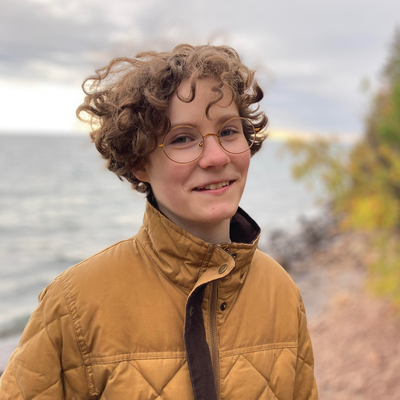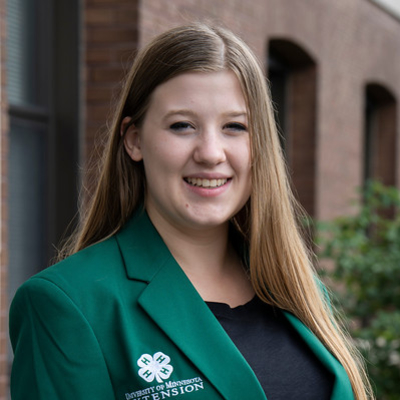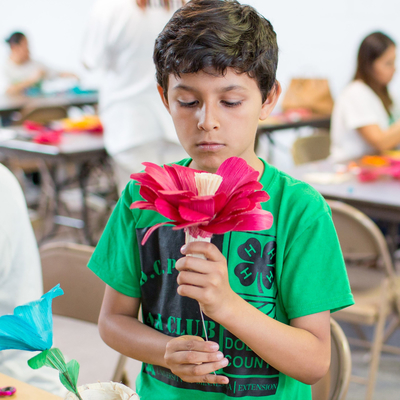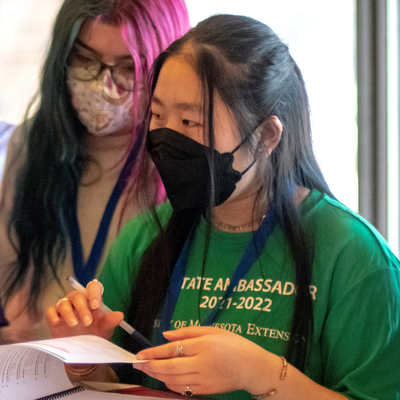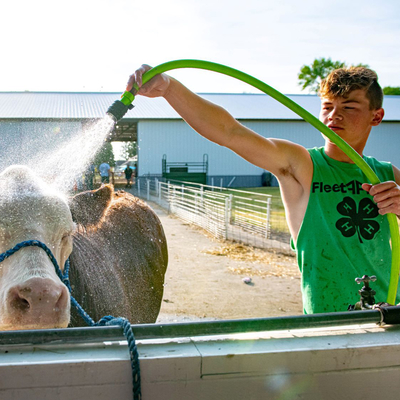The 4-H pledge plays out in the lives of young people across Minnesota
If the 2020s are getting you down, talk to a 4-H’er. While everyone goes through tough times, many young people have helped their communities and themselves stay connected through the tenets of the 4-H pledge. 4-H is operated by Extension at the land-grant universities in each state, guided by faculty and educators, and supported by volunteers.
I PLEDGE my HEAD to clearer thinking,
Anya Howard lives in Lake County, where life on the water could easily be taken for granted.
Instead, the future naturalist or biologist spends time conducting citizen science in the 4-H Water Watchers program, one of many 4-H outdoor exploration efforts. Water Watchers work with local Soil and Water Conservation District staff and Extension educators to learn how to collect reliable data.
“In 4-H, we are encouraged to tell our family and friends about what we learn,” says Anya. For example, while with her cousins at her grandma’s cabin on Lake Amelie, she identified invasive snails and shared information about why they pose a threat and how to dispose of them.
Curly leaf pondweed is another threat. “It creates a surface mat that can reduce sunlight needed by other plants,” says Anya. 4-H gave her the opportunity to help manage a mass of it in Lake Superior. A lakeside demonstration taught her where aquatic invaders attach to boats. Now, Anya and the other Water Watchers can tell boaters how to prevent them from being introduced into new bodies of water.
my HEART to greater loyalty,
Victoria Shafer, a 4-H State Ambassador, loves connecting with others about the cool things young people do in 4-H, like performing arts. But she notices that, sometimes, not everyone is included in the fun. That can also happen at school, in town or even online.
“A lot of bullying comes from just not knowing, from not having experiences and conversations with people who aren’t just like us,” says the high school senior from Loretto in Wright County. In 4-H, a curriculum called “Let’s Talk About Race” taught her how to interrupt racism.
Victoria, who has been interested in gender equality since eighth grade, recently helped write a new curriculum called, “Let’s Talk About Gender Identity,” teaching about LGBTQ+ youth and identity.
“Friends have been asking for safe spaces to talk and learn,” says Victoria. She and others now train 4-H County Ambassadors so they can spread understanding across Minnesota.
“I have people close to me who are part of the LGBTQ+ community,” she says. “I want to be a strong ally for them, especially those who don’t already have very much support.”
my HANDS to larger service,
Chris Pulido is a member of the 4-H Pumas, a club in Dodge County that brings together youth from Spanish-speaking families who participate in camps, projects and activities with other Minnesota youth.
While Chris was born in the United States, he spends time visiting family in Mexico’s Sinaloa state and focuses his service on teaching others about Mexican culture.
“A lot of people don’t know what things are like in Mexico, so we help them learn,” he says. “One thing we shared at an event was a game called canicas. At first, people were confused because nobody there had ever seen it before.”
Before long, a line formed of all the people wanting to try the game and talk with the 4-H Pumas.
Chris has also learned about public service during a 4-H visit to Mantorville to talk with government leaders. And he’s done his part working in the 4-H food stand at the Dodge County fair. Food stand work is a time-honored tradition that raises money to help pay for activities 4-H’ers look forward to each year, such as summer camp, which Chris eagerly anticipates.
and my HEALTH to better living,
Ever since she was little, Nalani Vang of Cottage Grove in Washington County has worked to improve her chances at a medical career. A 4-H project on lung cancer helped her decide. Since then, she’s advocated for equitable health care access, and she promotes COVID-19 awareness through social media.
But Nalani feels that mental health is as important as physical health, and it needs more attention.
“People said high school was going to go by in a flash, but I didn’t think they meant in a Zoom,” she wrote in a school essay. “Online school has shown me that even overachievers, like myself, can slip through the cracks.”
Health, to Nalani, means taking care of yourself so you can be happy and content.
The oldest of many siblings and cousins, she often shares what she’s learned through experience: “You are the only person who really knows your limits and your goals. You’re not going to help anyone around you if you forget that. When you feel like you’re pushing yourself too hard, take a breather. Shut out the noise around you and reflect so you can heal.”
for my family, my club, my community, my country and my world.
Trent Sip, a junior from Norman County, joined 4-H in second grade, with help from his older brother. “Family is a big part of 4-H. It’s a really good thing when you have a lot of people behind you,” he says. Minnesota includes “family” in the 4-H pledge for just that reason, even though it is not part of the national 4-H pledge.
Farm life requires a strong work ethic. “I wake up every morning at 6, do chores, go to school, come back, do chores and make sure everything’s good,” says Trent. He likes to share his knowledge about agriculture. “They learn what it takes to feed the world, how food is made, and what it takes to grow it and all of that.”
His 4-H club and activities are a big parts of it, too.
“You learn to be a good sport and work with other people. I’ve been to the State Fair twice and I’ve had people come up to me and ask tons of questions,” Trent says. “I would say 4-H works on your social skills a lot.”
4-H alum and U of M student Valerie Sauder contributed Trent Sip’s profile.


